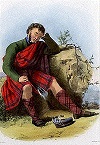| |
|
Clan Munro USA
Genealogy Pages
|
 |
|
 1819 - 1885 (65 years) 1819 - 1885 (65 years)
-
| Name |
Hugh Andrew Johnstone Munro [1] |
| Suffix |
M.A., Ll.D. |
| Born |
29 Oct 1819 |
Elgin, , Moray, Scotland  |
| Gender |
Male |
| Died |
30 Mar 1885 |
Rome, Italy  |
| Person ID |
I39561 |
Munro |
| Last Modified |
15 Jan 2011 |
| Father |
Hugh Andrew Johnstone Munro, of Novar, b. 13 Feb 1797, London, , Greater London, England  , d. 22 Nov 1864 (Age 67 years) , d. 22 Nov 1864 (Age 67 years) |
| Mother |
Penelope Forbes, b. Est 1799, d. Yes, date unknown |
| Family ID |
F13458 |
Group Sheet | Family Chart |
-
| Notes |
- Hugh received his early education in Elgin. He was later sent by his father to Shrewsbury, where he became one of the most distinguished pupils of Professor Kennedy, and later became Professor of Greek at Cambridge.
His University career was a series of brilliant successes. In 1842 he received his degree with honors, being second in the classical tripos. He was a Fellow of Trinity College, and was for some years Professor of Latin in the University of Cambridge.
He is universally admitted to have been the best Latin scholar of his day in Britain. He was also recognised as such on the Continent after his edition of Lucretius, which secured for him a European reputation. He was also widely known for his Elucidations of Catullus.
**********
«i»Hugh Andrew Johnstone Munro (29 October 1819 - 30 March 1885) was a British classical scholar.
Munro was born at Elgin, Moray , Scotland, the illegitimate son of Hugh Andrew Johnstone Munro of Novar by Penelope Forbes, and educated at Shrewsbury School, where he was one of Benjamin Hall Kennedy 's first pupils. He went on to Trinity College, Cambridge, in 1838, becoming a scholar in 1840, second classic and first chancellor's medallist in 1842, and fellow of his college in 1843. He became classical lecturer at Trinity College, and in 1869 was elected to the newly-founded chair of Latin at Cambridge, but resigned it in 1872.
The great work on which his reputation rests is his edition of Lucretius, the fruit of many years' efforts (text only, 1 vol., 1860; text, commentary and translation, 2 vols, 1864). As a textual critic his knowledge was profound and his judgment unrivalled; and he studied archaeology , being a frequent traveller in Italy and Greece. In 1867 he published an improved text of Aetna with commentary, and in the following year a text of Horace with critical introduction, illustrated by specimens of ancient gems selected by Charles William King. His knowledge and taste are nowhere better shown than in his Criticisms and Elucidations of Catullus (1878). He was a master of the art of Greek and Latin verse composition. His contributions to the famous volume of Shrewsbury verse, Sabrinae corolla, are among the most remarkable of the collection.
His Translations into Latin and Greek Verse were privately printed in 1884. Like his translations into English, these are characterized by minute fidelity to the original, but never cease to be idiomatic. He died while visiting Rome.
A Memoir by J. D. Duff was prefixed to a re-issue of the translation of Lucretius in "Bohn's Classical Library" (1908).«/i»
(Wikipedia - "Hugh Andrew Johnstone Munro" - 16 Jan 2011)
**********
References:
(1) "History of the Munros of Fowlis" by A. Mackenzie - Inverness (1898) - p. 538
Compiled and edited by Allen Alger, Genealogist, Clan Munro Association, USA
|
-
| Sources |
- [S783] Wikipedia, Wikipedia.org, (http://www.wikipedia.org/ : continuously updated), accessed 16 Jan 2011), Hugh Andrew Johnstone Munro (Reliability: 3).
|
|
|
|